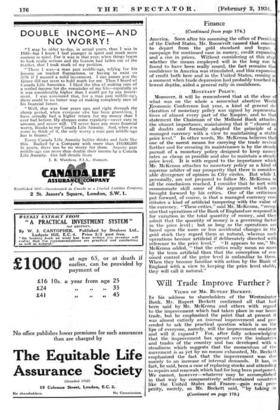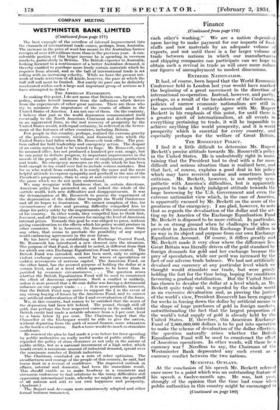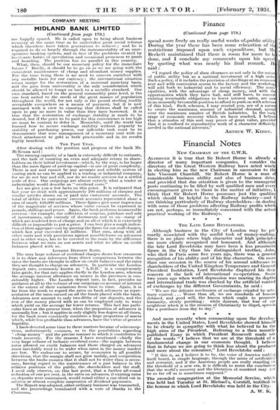Will Trade Improve Further ?
VIEWS OF MR. RUPERT BECKETT.
IN his address to shareholders of the Westminster Bank, Mr. Rupert Beckett confirmed all that had been said by Mr. McKenna and others with regard to the improvement which had taken place in our home trade, but he emphasized the point that at present it was almost entirely an internal improvement and pro- ceeded to ask the practical question which is on the lips of everyone, namely, will the improvement continue and will it expand ? For, after fully acknowledging that the improvement has spread over the industries and trades of the country and has developed with a steadiness which suggests that the momentum of the movement is as yet by no means exhausted, Mr. Beckett emphasized the fact that the improvement was due mainly to an increase of internal demands. It has, in fact, lie said, been a case of replacing stocks and attending to repairs and renewals which had for long been postponed. We cannot, however—whatever may be accomplished in that war by comparatively self-contained countries like the United States and France—gain real pros- perity, 'merely, as Mi. Beckett said, by taking in (Continued on page 178.)
Finance
.,(Continued from page 176) each other's washing." - We are a nation dependent _upon having to make payment for our imports of food- stuffs and raw„ materials by an adequate volume of exports, and not until there is a far larger volume of trade between nations in which our manufacturers and shipping companies can participate can we hope to obtain such a revival in trade as will once more reduce our figures of unemployment to modest dimensions.
EXTREME NATIONALISM.
It had, of course, been hoped that the World Economic Conference held in London last year would have marked the beginning of a great movement -in the direction of international co-operation. Instead, however, and partly, perhaps, as a result of the breakdown of the Conference, policies of narrow economic nationalism are still in the ascendant and I entirely agree with Mr. Rupert Beckett in his emphasis of this point, for until there is a greater spirit of internationalism, at all events in everything pertaining to trade, it will be impossible to achieve anything like world prosperity, and it is world prosperity which is essential for every country, and especially perhaps for the welfare of Great Britain.
THE ROOSEVELT POLICY.
I find it a little difficult to determine Mr. Rupert Beckett's precise attitude towards Mr. Roosevelt's policy in the United States. He is undoubtedly right in main- taining that the President had to deal with a far more difficult and serious situation than is realized here, and that fact, of course, explains a good deal in his policy which may have received undue and sometimes harsh criticism. Mr. Beckett, however, is not merely sym- pathetic with America's difficulties, but is apparently prepared to take a fairly indulgent attitude towards the huge borrowing by the U.S. Government and even the extreme nationalist view which, in the case of America, is apparently excused by Mr. Beckett on the score of the greatness of the emergency. I am glad, however, to note that as regards the devaluation of the dollar and the set- ting up by America of the Exchange Equalization Fund Mr. Beckett is disposed to be more critical. In particular, he is on strong ground when he challenges the idea so prevalent in America that this Exchange Fund differs in no way in its object and purpose from our own Exchange Equalization Account. Of course, it differs greatly and Mr. Beckett made it very clear where the difference lies. Great Britain was literally driven off the gold standard by foreign demands for gold and her exchange became the prey of speculators, while our peril was increased by the fact of our adverse trade balance. We had not artificially devalued our currency at any particular level which we thought would stimulate our trade, but were grimly holding the fort for the time being, hoping for conditions favouring a gradual stabilization. But the United States has chosen to devalue the dollar at a level which, as Mr. Beckett quite truly said, is regarded by the whole world as an excessive devaluation and, as proving the justice of the world's view, President Roosevelt has been engaged for weeks in forcing down the dollar by artificial means in the shape of huge purchases of gold in foreign markets, notwithstanding the fact that the largest proportion of the world's total supply of gold is already held by the United States. If, therefore, this American Exchange Fund of 2,000,000,000 dollars is to be put into operation to make the scheme of devaluation of the dollar effective, the question naturally arises whether the British Equalization Fund will be used to counteract the effect of American operations. In other words, will there be a currency war ? Needless to say, the Chairman of the Westminster Bank deprecated any such event as currency conflict between the two nations.
MUNICIPAL OUTLAYS.
At the conclusion of his speech Mr. Beckett referred once more to a point which was an outstanding feature of his speech a twelve-month ago. He was, kit year, strongly of the opinion that the time had come when public authorities in this country might be encouraged to
(Continued on page 180)
Finance - (Continued from page 178.) spend more freely on really useful works otpublic utility During the year there has been some relaxation of t restrictions imposed upon such expenditure, but Mr Beckett maintained that there is room for more to s. done, and I conclude my comments upon his speec by quoting what was nearly his final remark. said :
"I regard the policy of slum clearance as not only in the natu of public utility but as a national investment of a high order Such a policy, if it includes the provision of dwellings at an econom rent and with convenient access to the factory and the workshop, will add both to industrial and to social efficiency. The muai. cipalities, with the advantage of cheap money, and with the opportunities which they have had, and still have, to conve existing terminable obligations to lower interest rates, are no in an unusually favourable position to afford to push on with wheel of this kind. Such schemes, I may remind you, are of a nat to create the maximum amount of industrial demand, spread over the maximum number of British industries. In the early stage of economic recovery which we have reached, I believe that a stimulus of this sort may prove of great value, provided that it is confined to reproductive work of a character definitely needed in the national interests."
ARTHUR W. KIDDY.










































 Previous page
Previous page